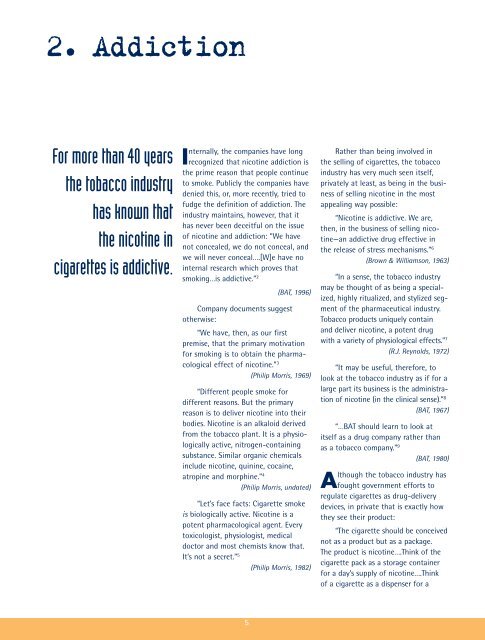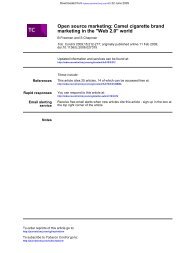Trust Us We're The Tobacco Industry - Tobacco Control Supersite
Trust Us We're The Tobacco Industry - Tobacco Control Supersite
Trust Us We're The Tobacco Industry - Tobacco Control Supersite
Create successful ePaper yourself
Turn your PDF publications into a flip-book with our unique Google optimized e-Paper software.
2. Addiction<br />
For more than 40 years<br />
the tobacco industry<br />
has known that<br />
the nicotine in<br />
cigarettes is addictive.<br />
Internally, the companies have long<br />
recognized that nicotine addiction is<br />
the prime reason that people continue<br />
to smoke. Publicly the companies have<br />
denied this, or, more recently, tried to<br />
fudge the definition of addiction. <strong>The</strong><br />
industry maintains, however, that it<br />
has never been deceitful on the issue<br />
of nicotine and addiction: “We have<br />
not concealed, we do not conceal, and<br />
we will never conceal….[W]e have no<br />
internal research which proves that<br />
smoking…is addictive.” 2<br />
5<br />
(BAT, 1996)<br />
Company documents suggest<br />
otherwise:<br />
“We have, then, as our first<br />
premise, that the primary motivation<br />
for smoking is to obtain the pharmacological<br />
effect of nicotine.” 3<br />
(Philip Morris, 1969)<br />
“Different people smoke for<br />
different reasons. But the primary<br />
reason is to deliver nicotine into their<br />
bodies. Nicotine is an alkaloid derived<br />
from the tobacco plant. It is a physiologically<br />
active, nitrogen-containing<br />
substance. Similar organic chemicals<br />
include nicotine, quinine, cocaine,<br />
atropine and morphine.” 4<br />
(Philip Morris, undated)<br />
“Let’s face facts: Cigarette smoke<br />
is biologically active. Nicotine is a<br />
potent pharmacological agent. Every<br />
toxicologist, physiologist, medical<br />
doctor and most chemists know that.<br />
It’s not a secret.” 5<br />
(Philip Morris, 1982)<br />
Rather than being involved in<br />
the selling of cigarettes, the tobacco<br />
industry has very much seen itself,<br />
privately at least, as being in the business<br />
of selling nicotine in the most<br />
appealing way possible:<br />
“Nicotine is addictive. We are,<br />
then, in the business of selling nicotine—an<br />
addictive drug effective in<br />
the release of stress mechanisms.” 6<br />
(Brown & Williamson, 1963)<br />
“In a sense, the tobacco industry<br />
may be thought of as being a specialized,<br />
highly ritualized, and stylized segment<br />
of the pharmaceutical industry.<br />
<strong>Tobacco</strong> products uniquely contain<br />
and deliver nicotine, a potent drug<br />
with a variety of physiological effects.” 7<br />
(R.J. Reynolds, 1972)<br />
“It may be useful, therefore, to<br />
look at the tobacco industry as if for a<br />
large part its business is the administration<br />
of nicotine (in the clinical sense).” 8<br />
(BAT, 1967)<br />
“…BAT should learn to look at<br />
itself as a drug company rather than<br />
as a tobacco company.” 9<br />
(BAT, 1980)<br />
Although the tobacco industry has<br />
fought government efforts to<br />
regulate cigarettes as drug-delivery<br />
devices, in private that is exactly how<br />
they see their product:<br />
“<strong>The</strong> cigarette should be conceived<br />
not as a product but as a package.<br />
<strong>The</strong> product is nicotine….Think of the<br />
cigarette pack as a storage container<br />
for a day’s supply of nicotine….Think<br />
of a cigarette as a dispenser for a




